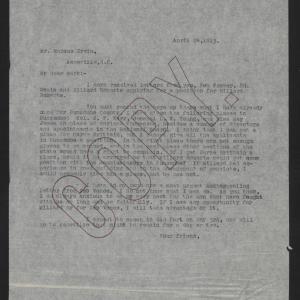Excerpt transcribed from "Governor Craig Replies to Page," News and Observer (Raleigh), 14 February 1915.
[circa 14 February 1915]
The Governor's letter follows:
"Your letter delivered to me on the 9th in regard to the leasing of convicts to the Elkin and Alleghany Railroad Company would have been answered sooner, but for the demands of other business.
"I have given careful consideration to your inquiry as to what construction I place upon section 20, of the act constituting the charter of the Elkin and Alleghany Railroad, making the approval of the Governor a prerequisite to the assignment of convicts of this road. In your letter you construe the act as follows:
"'Whenever in the exercise of his (the Governor's) sound discretion he finds as a fact that the commodity to be received in payment for the labor of these convicts is actually and really and truly worth its face value in money, then, and not until then, can he be permitted to accept same in payment under the act quoted, as modified and controlled by the constitution of the State. There is nothing else that he can possibly be supposed to use discretion about. I, therefore, think it is perfectly clear that the intention of the General Assembly of 1907 was to authorize the exchange of convicts for stock in the Elkin and Alleghany Railway, when, and only when, the Governor should be entirely satisfied that such stock was worth its face value in money.'
Differs on Interpretation.
"I cannot agree with your interpretation of this law. I am satisfied that the Legislature not only did not have the intention stated by you, but that it had the very opposite intention. There is nothing in the language of the act to warrant your conclusion. If the General Assembly had such intention, it certainly should and would have expressed it. When the act was before the General Assembly, the pay for the convicts was the principal question considered. This was the distinctive feature of the act. The purpose of section 20 was to enable the Elkin and Alleghany Railroad Company to obtain the use of convicts, and the pay the State therefor, in stock that was not 'actually and really and truly worth its face value in money.' By this means the State would assist the people of that remote section to get a railroad. It had assisted other sections to get railroads. If the General Assembly had authorized the appropriation of convicts to the Elkin and Alleghany only upon the condition that they should be paid for in stock and that was 'tctually and really and truly worth its face value in money,' this section of the act would have been of no assistance in building the road, and would have conferred no benefit upon that section of the State. Neither Governor Glenn nor Governor Kitchin nor I read into this act the meaning that you contend for, but on the contrary, three Governors in succession have interpreted the act to mean what is says, to wit: that available convicts be assigned to this road, and the stock of the railroad company taken as pay therefor, although this stock is not 'actually and really and truly worth its face value in money.' This whole situation was clearly understood by the General Assembly of 1907 that passed the act, and since then four General Assemblies have met. All have acquiesced without question in the construction placed upon this law by the different governors. Two of the General Assemblies have endorsed the present policy, after full investigation and discussion. This stock has been received in payment for convicts by the State treasurer since 1907. It has always been conceded that it has no market value, and, that it may never have any value. This is shown by the report of the State treasurer. It was stated in my message to the General Assembly, and you state in your letter, that such is 'the practical admission of the fact by every one of the gentlemen now defending the deal before committees and the Senate.' These conditions have been thoroughly understood since 1907 by all persons informed on the subject, and no citizen of the State, and no General Assembly has ever before sought to place your construction upon the charter of the Elkin and Alleghany Railroad. The present Senate by an overwhelming majority declined to adopt your view on a clear cut presentation of the question, and the present House of Representatives is so pronounced against your construction of this law, that you have decided as I am informed, not to contend further before that body of which you are a member. This General Assembly now in session, after full discussion, has refused to require money value for these convicts. In the face of these facts, I cannot conclude that this General Assembly, nor that any other General Assembly intended that this railroad should have convicts 'when, and only when, the Governor should be entirely satisfied that such stock was worth its face value in money.' The moving consideration for the appropriation by the State of these convicts to aid in the construction of these roads is not the stock in the railroad companies. The real compensation to the State in the prospective development of rich and inaccessible sections inhabited by a portion of our citizenship desiring and deservng the facilities of communication and transportation with other portons of the State. IT seems to me that this is thoroughly understood and well established.
Duty to Execute Law.
"Nor can I treat this statute as a nullity because in conflict with the constitution. It is not, as I conceive the prerogative of the governor, nor even of the courts to declare acts of the General Assembly unconstitutional and void; except in clear and extreme cases. It is the governor's duty, not to disregard, but to execute the laws made by the people, and by the representatives of the people.
"When the constitutional convention of 1875 ordained that 'The General Assembly shall have no power to give or lend the credit of the State in the aid of any person, association or corporation,' it doubtless had in mind the millions of fraudulent bonds issued by the Reconstruction Legislature for the pretended purpose of building railroads. Does this section of the constitution prohibit the Legislature from aiding remote sections of the State in securing railroad facilities by the leasing of convicts, when no obligation is incurred by the State, although the stock paid for these convicts may not be worth its face value in money? Able lawyers differ as to the meaning of this section of the constitution, and as to its application to this situation.
"In passing upon the appropriation of these convicts to the Elkin & Alleghany Railroad and to other roads, there are many considerations to influence the discretion of the governor or the board clothed with such discretion, the feasibility of the enterprise, the extent of the benefits, the condition and requirements of the prison, and many other things might enter into the consideration of the governor of the board making the appropriation.
Not Responsible for Policy.
"I am not responsible for the present policy. The General Assembly is responsible. I expect to exercise the power and discretion vested in me in accordance with what I conceive to be the will of the General Assembly, with due regard for the economic management of the prison and the rights of all concerned. I shall not order the withdrawal of the convicts from the railroads on the grounds contended for in your letter. I am satisfied that such is not the will of the General Assembly. If the power to appropriate these convicts be continued in the governor, I shall continue the present policy to aid inaccessible sections in obtaining railroad facilities, provided I am assured that these railroads will be built to points that will benefit the remote sections, that the railroad companies will do their part, and that the enterprise is conducted in good faith for the benefit of these sections that the State desires to help and to develop. I shall at all times act as the situation may require, and withdraw the convicts, provided their withdrawal be advisable after considering all the circumstances.
"The Board of Prison Directors is the proper authority to administer all of the affairs of the prison, including the appropriation of these convicts. I therefore recommended in my message to the General Assembly that the power and discretion now vested in the governor and Council of State as to the appropriation of these convicts, be vested in the Board of Prison Directors. Whether this act be passed or not, I would not avoid responsibility for what has been done in the appropriation of these convicts, or for what may be done.
"I deem it my duty as governor to make a full and candid reply to your letter and to give you my reasons for the position which I have taken."
[unsigned]




